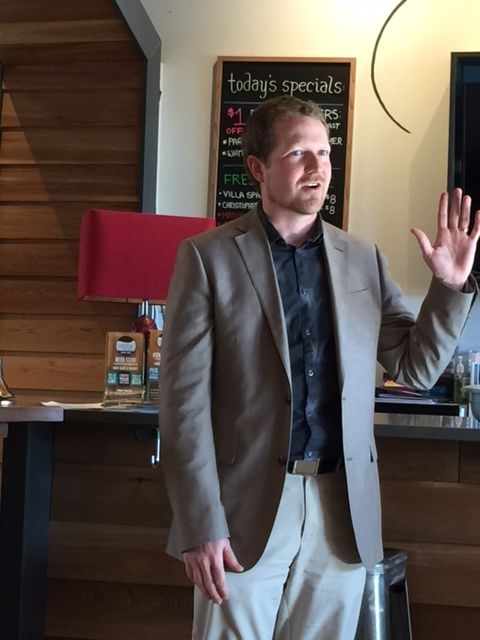North Notes
Spokane North Rotary Club Bulletin
February 26, 2018
Briefly:
PETS note: Lenore Romney went to Seattle for the President-Election Training Seminar, a refresher for her term next Rotary year. She returned with a cold, some magnetic Rotary pins for sale (no need to poke holes into fabrics) and a load of new ideas on how to help our club. PETS Rotarians from nine Northwest districts gathered at Sea-Tac for the seminar. Lenore has served two terms in recent years as club president.
March duties: President Chad Haverkamp reminds that the new month brings a new list of roster volunteers. He included Sandy Fink at the welcoming desk, Jon Heideman at invocation and pledge and Dave Peterson as sergeant-at-arms.
Times unsettled for agency resettlement effort
It’s getting to be a small, small(er) world as federal funds get shorter and shorter for a key agency for refugees.
 While worldwide refugee totals have reached 22.5 million – “the highest ever” – Mark Finney, director of World Relief
While worldwide refugee totals have reached 22.5 million – “the highest ever” – Mark Finney, director of World Relief Spokane, said the affected immigrant total “has been sharply cut, from 110,000 in the Obama administration to 45,000 in the Trump administration. “A precipitous climb,” Finney told the club at the Feb. 26 meeting.
Finney added that “refugees” are those who crossed international borders and who filed that status with the United Nations. He said some 65 million people are in “displaced” persons forced to leave home.
The Baltimore-based World Relief partners with the State Department and with local churches and others to train and educate refugees in a dozen countries, mostly in Africa and Asia, plus Haiti. World Relief was organized in 1948 and the Spokane office, now at 1522 N. Washington, opened in 1992.
Finney said Spokane placements come from a wide range of countries, but also has strong connections to the Slavic and Russian people who come here.
His global interests started as a youth pastor who had traveled in India and south Asia.
Finney said his agency has a 90-day resettlement process, meeting adult refugees at the airport as they arrive, then finding housing, jobs or job training, legal help as needed, English skills as needed, and other activities to help the immigrants. He said half of the refugees arriving here are younger than 18.
Some 400 volunteers a year serve as “a friend paired to a refugee,” Finney said. He said security concerns among refugees are not an issue, citing statistics that “crime rates among refugees go down.”
World Relief is a Christian organization, but also serves Muslim clients and those of other faiths.
The agency’s interests also overlap with some of the legal issues of “Dreamers” and “DECAs,” Deferred Action for Children Arrivals. Spokesman-Review articles and other media outlets report that 19,000 people live in Washington State without legal status.
As the S-R noted, Finney spoke Feb. 22 about refugee and immigrant issues at a vigil and march from First Presbyterian Church to the Monroe Street Bridge. The Trump Administration announced in September that the DECA program would be ended, but federal courts have kept the program open temporarily while Congress mulls its alternatives.
‘Jackson’s’ story is compelling
When Mark Finney, director of World Relief Spokane, ended his talk he asked “Jackson” to talk about his story.
.JPG) “Jackson” is Jackson Eremugo Lino, and as he described his travels from South Sudan to Spokane, the silent, rapt attention focused on his story.
“Jackson” is Jackson Eremugo Lino, and as he described his travels from South Sudan to Spokane, the silent, rapt attention focused on his story. Jackson, born in 1988, was part of a family of 13 brothers and sisters. He said he and his twin brother were just age 2 when his parents died and the children were placed in an orphanage.
Militants raided the orphanage to commandeer child-soldiers for their ranks. Jackson said when he was forced to attack a family in a hut when the father there told him he didn’t need to shoot people. The father rose from the floor and gave Jackson a hug, he said. Jackson said the emotional hug caused Jackson to cry and changed his life.
Trying to escape the fighting, Jackson and others moved to Cairo and were resettled in Boise.
“That was 17 years ago, and I’m still cold,” Jackson said, adding he still keeps a leather coat on “24 hours a day,” on icy days like Monday.
Among his luxuries, he said was “a tap with fresh water – what!! – at home (in Sudan) we had to walk 13 miles one way” to get clean water.
In one anecdote on-line, not shared at our meeting, Jackson said the first time he lined up at a cross-country race, when the starter’s gun was fired to begin the fun, Jackson “fell to the ground,” a fear reflex.
Jackson now works as a resettlement specialist for World Relief and his talk during our meeting was just his third talk that day.
Jackson said, “They (the refugees) don’t need material stuff (except, perhaps, winter coats), but they need their love.”
The bulletin producers:
Bulletin editors: Chuck Rehberg and Sandy Fink
Photos: Sandy Fink and Eric Johnson
Program coordinator: Brad Stark
